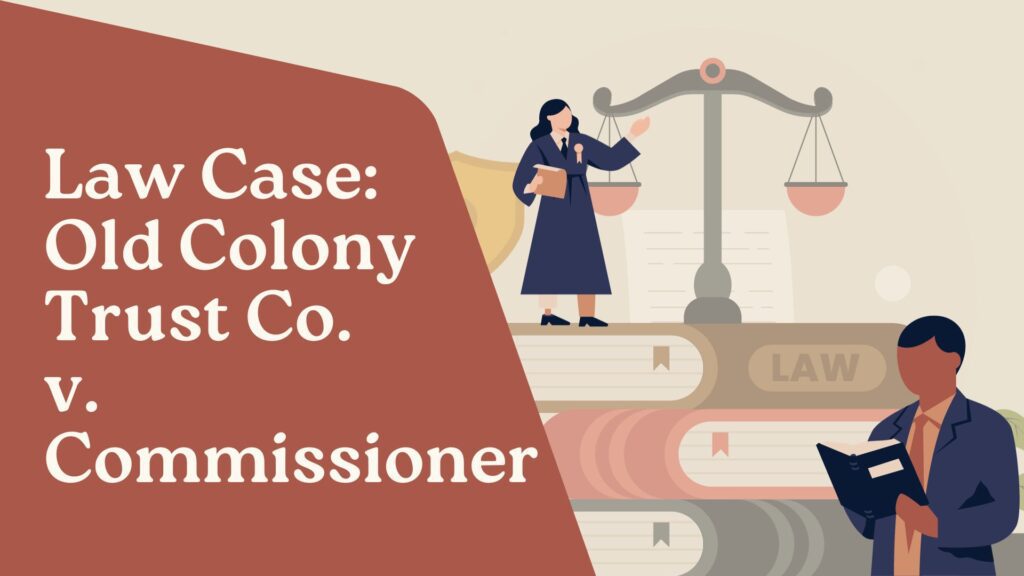The law case Old Colony Trust Co. v. Commissioner (1929) originated in the United States Board of Tax Appeals, and was subsequently appealed to the United States Circuit Court of Appeals for the First Circuit. The final appeal was made to the United States Supreme Court.
This article covers a brief overview of this law case example, along with providing an additional example of how this case law impacts modern tax law.

Facts
In this case, the Old Colony Trust Company paid the personal income tax of one of its employees, Frederick Ayer, on his behalf as part of his compensation. Ayer was a high-ranking executive at the company. The Commissioner of Internal Revenue argued that the payment of Ayer’s income tax by the employer constituted additional taxable income to Ayer, leading to an increased tax liability.
Issue
The central issue in this case was whether the payment of an employee’s personal income tax by the employer should be considered as additional taxable income for the employee.
Holding
The United States Supreme Court held that the payment of an employee’s personal income tax by the employer does constitute additional taxable income for the employee.
Rationale
The Court reasoned that the payment of an employee’s personal income tax by the employer conferred an economic benefit upon the employee. Such a benefit was regarded as a form of compensation, and therefore, it was appropriate to include it as part of the employee’s taxable income. The Court rejected the argument that the payment of the tax was merely a business expense and held that it was akin to providing additional salary or compensation.
Dissenting Opinion
There were no dissenting opinions in this case; the decision was unanimous.
Impact
Old Colony Trust Co. v. Commissioner had a significant impact on the taxation of employer-provided benefits and the treatment of compensation in tax law. It also established the principle that when employers pay an employee’s personal expenses, such as income tax, it should be considered part of the employee’s taxable income.
In other words, this case set a precedent for the treatment of such benefits in the calculation of taxable income.
Significance
The case is considered a landmark decision in the realm of taxation and employee compensation. It clarified the tax treatment of benefits provided by employers to employees, and its principles continue to be cited and applied in discussions of tax law.
Related Cases
While Old Colony Trust Co. v. Commissioner is significant on its own, it has implications for the broader area of tax law, particularly regarding the taxability of fringe benefits and other forms of employee compensation. It continues to be referenced in legal discussions and cases related to employee compensation and taxation.
Example and Application of Old Colony Trust Co. v. Commissioner
Let’s say you’re a highly paid executive in a company. As part of your compensation package, your employer agrees to pay your personal income taxes on your behalf. The total income tax liability that your employer pays for you is $50,000.
Without Old Colony Trust, this payment would not be considered taxable income for you, and you would not have to pay any additional taxes on it.
However, if the principles of Old Colony Trust are applied, the $50,000 payment by your employer would be considered additional taxable income for you. You would therefore be required to report this amount on your income tax return, and you would owe income tax on it according to your tax bracket.
As a result, the decision in Old Colony Trust Co. v. Commissioner set the precedent that such payments by employers are taxable income to the employee.
Application
– Employee Benefits Taxation
The Old Colony Trust decision has a direct application in the taxation of employee benefits and compensation packages. Employers often provide various fringe benefits to employees, such as health insurance, housing allowances, or even personal income tax payments. Thus, the case of Old Colony Trust Co. v. Commissioner serves as a foundational principle for understanding how these benefits should be treated for tax purposes.
– IRS Regulations
The Internal Revenue Service (IRS) uses the principles established in Old Colony Trust to determine the taxability of various forms of compensation and benefits provided by employers. Employers and employees must consider these tax implications when structuring compensation packages and reporting income.
– Compensation Planning
Companies and employees alike must take the Old Colony Trust decision into account when structuring compensation packages. It influences how they calculate the true financial impact of various forms of compensation, including non-cash benefits. Employers need to understand how providing certain benefits may affect their employees’ tax liabilities.
Conclusion
In summary, Old Colony Trust Co. v. Commissioner has a lasting impact on how employee benefits and compensation are taxed and serves as a cornerstone for understanding the tax implications of various forms of employer-provided benefits.
It is applied in real-world scenarios to determine the taxability of these benefits and provides clarity in the field of taxation and compensation planning.
Some other impactful cases that affect modern tax law today include:
Reference:
- Justia US Supreme Court Center: Old Colony Trust Co. v. Commissioner :: 279 U.S. 716 (1929)

Comments
Pingback: Commissioner v. Glenshaw Glass Co.: Accession to Wealth Doctrine - CovertProfession